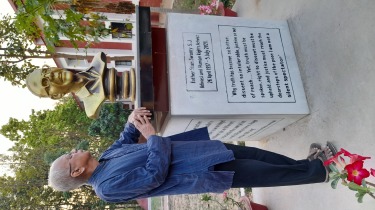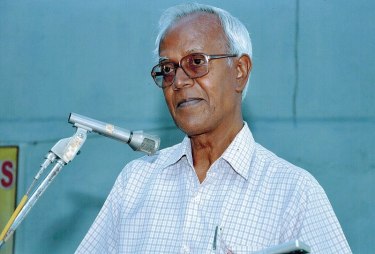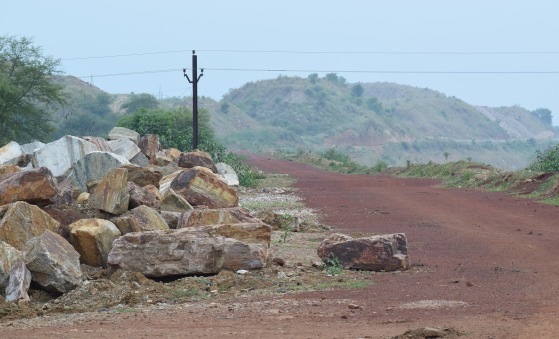
Just before his arrest in October 2020, in a video-message that went viral, Fr. Stan Swamy said, “What is happening to me is not something unique happening to me alone. It is a broader process that is taking place all over the country. We are all aware how prominent intellectuals, lawyers’ writers, poets, activists, students, leaders, they are all put into jail because they have expressed their dissent or raised questions about the ruling powers of India. We are part of the process. In a way I am happy to be part of this process. I am not a silent spectator, but part of the game, and ready to pay the price whatever be it.” Those profound words in fact are an apt signature statement from the quintessential Stan Swamy! Always ready to be visible and vocal; to take a Stand! Always in the context of the other!
Fr. Stan was illegally arrested on 8 October 2020. He was then incarcerated in the Taloja jail on the outskirts of Bombay. He languished there till his deteriorating health conditions prompted the Special Court to direct the jail authorities to admit him to a private hospital in Bombay. Exactly three years ago, on 5 July 2021, Fr. Stan finally succumbed, despite the best possible medical treatment given to him (by the Catholic hospital) at that time! It was indeed too little, too late! For one, Stan should never have been arrested; secondly, the frail 84-year-old Jesuit priest was already suffering from severe health ailments. His death was universally regarded as an “institutional murder.” It was nothing short of that! Till today, Fr. Stan has not yet been exonerated of the trumped-up charges in the Bhima- Koregaon conspiracy case. The legal fight for his acquittal and his complete exoneration is still on! Till his last breath, Fr. Stan was not a silent spectator!
As a young Jesuit and Catholic priest, Fr. Stan was a trainer, mentor, motivator, guide: inspiring hundreds of youths and others, through social awareness programmes and to critically analyse what was happening in society; there are many today, from across the board, who are and will always be grateful for the profound impact he left on their lives. For Fr. Stan, his heroes and icons were the likes of Paolo Freire, Dom Helder Camara and Fr. Pedro Arrupe. The documents of the Second Vatican Council of the Catholic Church and the faith -justice mandate which emerged from the 32nd General Congregation of the Society of Jesus, greatly shaped Fr. Stan’s way of proceeding: his thinking, his attitudes and his actions. Like Jesus his Master, he questioned and taught others to question and challenge all that is wrong and unjust in society and to respond constructively and positively to these issues. He always desired that the youth, the victims and others, to stand up, to speak out and to be counted; for he was never a silent spectator!
Fr. Stan did all he could to empower the Adivasis. He accompanied and struggled alongside them on issues related to the violation of laws in acquiring land for mega projects for mining and infrastructural development which flout the rights of the downtrodden and tribals. He consistently raised his voice in democratic, legitimate ways against the state-sponsored violations of laws and assault on democratic rights of people aimed at paving way for unrestricted exploitation of land and natural resources. He questioned the non-implementation of the 5th Schedule of the Constitution why the Panchayats (Extension to Scheduled Areas) Act [PESA], was being ignored. He strongly expressed his disappointment at the silence of the Government on the 1997 Samatha Judgment of the Supreme Court; he was visible and vocal at the half-hearted action of the Government on Forest Rights Act, 2006. He expressed his apprehensions at the Amendment to ‘Land Acquisition Act 2013’ by the Jharkhand government which was a death-knell for the Adivasi Community. He strongly disagreed with the setting up of ‘Land Banks’ which he saw as a calculated plot to annihilate the Adivasis. He challenged the indiscriminate arrest of three thousand young Adivasis under the label of ‘naxals’ just because they questioned and resisted unjust land-alienation and displacement. Yes, Fr. Stan was never a silent spectator!
An incisive and path-breaking book, ‘The Incarcerations: Bhima Koregaon and the Search for Democracy in India’ written by Alpa Shah, who teaches at the London School of Economics, was recently released. In the context of the above, Shah writes, “In July 2018. Stan found himself accused of sedition by the Jharkhand government, alongside nineteen others. He wrote an email to his friends on 28 July 2018 in defence of his new status has a national traitor. ‘FIRs have been made out. We are accused of supporting the self- rule movement taking place among Adivasis in Jharkhand and neighbouring states of central India. Pathalgadi (erection of stone slabs) listing the powers of gram sabha (village councils) as per PESA Act 1996 and declaring their right to self-governance. The state government is not able to digest this declaration and calls it “a war against the state” and all those who support it as desh drohi (a national traitor)! In an attachment to the email, Stan listed all the issues he had raised about the government and ruling class policy in the light of the Indian Constitution and concluded, ‘if this makes me a ‘desh drohi’, then so be it”! Yes, that was Fr. Stan who would never be a silent spectator!
Fr. Stan totally identified himself with those (particularly the sub-alterns) who were at the receiving end of a heartless and brutal system. He lived in the villages of Adivasis, ate their food, sang their songs, danced with them. His entire life was simple and frugal; his material possessions were the meagre necessities. He was a compassionate pastor! A true shepherd! He accompanied the people in their struggle for a more humane and just society. He believed and did his best to actualise the Constitutional values of justice, liberty, equality, fraternity and dignity of all. Fr. Stan was an authentic participant in the lives of the people: in their joys and hopes, in their anxieties and anguishes. He was visible; he spoke loudly and strongly; he was articulate, he studied and analysed society and the plight of the poor; he wrote and gave interviews (his letters and poems from jail are a testimony to this). He stood with the Adivasis against the powerful and other vested interests who robbed them of their ‘jal, jungle aur jameen’. He internalised and actualised the words of Pope Francis in ‘Evangelii Gaudium, “I prefer a Church which is bruised, hurting and dirty because it has been out on the streets, rather than a Church which is unhealthy from being confined and from clinging to its own security. I do not want a Church concerned with being at the centre and which then ends by being caught up in a web of obsessions and procedures.” He was never a silent spectator!
From Taloja Jail, during his incarceration, Fr. Stan wrote, “my needs are limited. The Adivasis and the Society of Jesus, have taught me to lead a simple life… Listening to the life narratives of the poor prisoners is my joy in Taloja Jail… I see God in their pains and smiles… Many of such poor under trials don’t know what charges have been put on them, have not seen their charge sheet and just remain for years without any legal or other assistance. The 16 co-accused have not been able to meet each other as we are lodged in different jails or different ‘circles’ with the same jail”; he concludes, “But we will still sing in chorus. A caged bird can still sing” Fr. Stan, despite being in prison, had a song to sing – he was no silent spectator!
On 21 May 2021, he shared with the Bombay High Court the suffering he was subject to, whilst in prison. He said “I was brought here eight months ago. When I came to Taloja, my full system, my body was still very functional. But during these eight months, I have gone through a steady regression of all bodily functions. Eight months ago, I could have a bath by myself and also do some writing by myself. But these are disappearing one after another. Taloja jail brought me to a situation where I can neither write nor go for a walk by myself or even eat. I am not able to meet this demand. Eating has become a real difficulty; someone has to feed me with a spoon.” He also spoke about the dire conditions in Taloja jail that prompted prisoners to help each other in the face of acute economic deprivation. He was always touched by the help he received from his fellow prisoners. He perhaps had an intuition of his death – he pleaded to be given regular bail and go back to Ranchi to be in the midst of his people. “I want to go to Ranchi to be with my friends…. Whatever happens to me I would like to be with my own;” if not, he said he would continue to be in Taloja jail “I would rather die here very shortly if things go on as it is.” He was not a silent spectator, even towards the end of his life!

Fr. Stan has left us with his indomitable spirit which is an unparalleled legacy. Even after his death, he challenges us to do much more, in the face of the deteriorating situation and the human rights violations abiding in India. The reality is bad in every sphere: political, economic and social. Global surveys on significant indicators put India either rock-bottom or among the worst. Divisiveness, discrimination, demonization and denigration of minorities hold sway; hate and violence is mainstreamed. Constitutional bodies which are meant to be impartial and objective are pathetically compromised and even destroyed to become pawns of the political masters. The less said about paid “godified” media the better!
Today, millions of people all over: the Adivasis and the Dalits, the excluded and the exploited, the marginalised and the exploited, the displaced and the denied, the poor and other vulnerable, the academics and the writers, human rights defenders, other civil society and political leaders remember him fondly. The reason is obvious: for all of them, he was never a silent spectator!
The celebrated Lebanese writer Kahlil Gibran, in his immortal work ‘The Prophet’ writes,
“Know, therefore, that from the greater silence I shall return.
The mist that drifts away at dawn, leaving but dew in the fields,
shall rise and gather into a cloud and then fall down in rain.
And not unlike the mist have I been.
In the stillness of the night, I have walked in your streets,
and my spirit has entered your houses,
And your heart–beats were in my heart,
and your breath was upon my face, and I knew you all.
Aye, I knew your joy and your pain,
and in your sleep your dreams were my dreams.
And oftentimes I was among you a lake among the mountains.
I mirrored the summits in you and the bending slopes,
and even the passing flocks of your thoughts and your desires.
And to my silence came the laughter of your children in streams,
Fr. Stan Swamy was indeed a Courageous Prophet who walked the talk!! Today, he challenges us all never to be silent spectators in the midst of growing injustices, impoverishment and gross violations of human rights all around us!
He says to us, “I am not a silent spectator.”
Do we have the courage to be and do likewise?
Fr. Cedric Prakash SJ is a Catholic Priest and belongs to the Society of Jesus. He is a human rights, reconciliation and peace activist/writer. For his work, he has received several international and national awards/recognitions including ‘the Legion of Honour’ from the President of France and the ‘Kabir Puraskar’ – for the promotion of harmony and peace- from the President of India Contact: cedricprakash@gmail.com.




